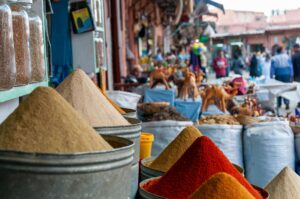Clean Beauty Around the World

Beauty knows no bounds—it transcends borders, cultures, and traditions. As the clean beauty movement continues to gain momentum, it’s essential to recognize the diverse cultural influences that shape our perception of beauty and skincare practices around the world. From ancient remedies to modern innovations, let’s embark on a journey to discover how different cultures have embraced clean beauty and natural cosmetics throughout history.
1. Japan: The Art of Minimalism
In Japan, beauty is synonymous with simplicity and harmony. Influenced by centuries-old traditions such as Shintoism and Zen Buddhism, Japanese skincare rituals emphasize purity, balance, and mindfulness. Clean beauty in Japan revolves around natural ingredients like rice bran, green tea, and seaweed, which have been prized for their nourishing and healing properties for generations.
One iconic Japanese skincare practice is the double cleansing method, which involves using an oil-based cleanser followed by a water-based cleanser to remove impurities without stripping the skin’s natural oils. This gentle yet effective approach to cleansing reflects Japan’s commitment to maintaining healthy and radiant skin using minimalistic and natural techniques.
2. India: Ayurveda and Herbal Remedies
In India, beauty is deeply rooted in Ayurveda, an ancient holistic healing system that emphasizes the balance of mind, body, and spirit. Ayurvedic skincare revolves around the use of herbs, botanicals, and natural oils to promote overall well-being and enhance beauty from the inside out. Ingredients like turmeric, neem, and sandalwood are revered for their purifying, anti-inflammatory, and rejuvenating properties.
One popular Ayurvedic skincare practice is the application of ubtan, a traditional herbal paste made from powdered herbs, grains, and lentils mixed with milk or rose water. Ubtan is used as a gentle exfoliant and skin brightener, leaving the complexion radiant and glowing. Indian women also incorporate natural oils like coconut oil and almond oil into their beauty routines to moisturize and nourish the skin.
3. Morocco: The Beauty of Argan Oil
Morocco is renowned for its rich beauty traditions and the luxurious properties of argan oil. Harvested from the kernels of the argan tree, which grows exclusively in the southwestern region of Morocco, argan oil is prized for its hydrating, anti-aging, and antioxidant-rich properties. For centuries, Moroccan women have used argan oil to nourish their skin, hair, and nails, earning it the nickname “liquid gold.”
One of the most iconic Moroccan beauty rituals is the hammam, a traditional steam bath that involves cleansing, exfoliating, and moisturizing the skin using natural ingredients like black soap, ghassoul clay, and argan oil. The hammam experience not only purifies the body but also rejuvenates the mind and soul, reflecting Morocco’s holistic approach to beauty and wellness.
4. Brazil: Rainforest Remedies
In Brazil, beauty is deeply connected to the lush biodiversity of the Amazon rainforest. Indigenous tribes have long relied on the healing properties of rainforest botanicals and plants to nourish their skin and protect against environmental damage. Ingredients like açai berry, cupuaçu butter, and buriti oil are prized for their moisturizing, antioxidant, and anti-inflammatory benefits.
One Brazilian beauty secret is the use of murumuru butter, derived from the seeds of the murumuru palm tree, to soften and condition the skin and hair. Brazilian women also incorporate açai berry into their skincare routines for its high antioxidant content, which helps combat free radical damage and promote a youthful complexion. These natural ingredients reflect Brazil’s commitment to sustainable and eco-friendly beauty practices that honor the earth and its resources.
5. Greece: Mediterranean Elixir
In Greece, beauty is celebrated as a reflection of health, vitality, and natural beauty. Inspired by the Mediterranean diet and lifestyle, Greek skincare traditions focus on simplicity, purity, and the use of locally sourced ingredients like olive oil, honey, and herbs. These natural treasures are renowned for their hydrating, soothing, and anti-aging properties, making them essential components of Greek beauty rituals.
One iconic Greek skincare practice is the use of olive oil as a multi-purpose beauty elixir. Rich in vitamins, antioxidants, and fatty acids, olive oil deeply nourishes and moisturizes the skin, leaving it soft, supple, and radiant. Greek women also incorporate honey into their skincare routines for its antibacterial and healing properties, as well as yogurt for its exfoliating and brightening effects.
Embracing Cultural Diversity in Clean Beauty
As we journey around the world, we discover a tapestry of beauty traditions and skincare rituals that celebrate the diversity of cultures and the richness of natural ingredients. From Japan’s minimalist approach to India’s Ayurvedic remedies, each culture brings its unique perspective and heritage to the world of clean beauty.

By embracing cultural diversity in clean beauty, we not only honor the wisdom of ancient traditions but also foster a deeper connection to the earth and its bounty. Whether it’s Moroccan argan oil, Brazilian rainforest remedies, or Greek olive oil, clean beauty allows us to explore the beauty of different cultures while nurturing our skin with the power of nature’s finest ingredients. Let’s celebrate the beauty of cultural diversity and continue to learn from each other as we embark on our clean beauty journey around the world.

